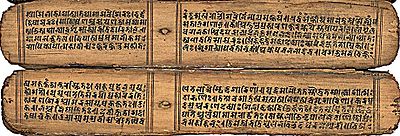
Why Sanskrit?
Hindu conservativism
- Most of all,to attain and preserve thepinnacles of the hindu way (in social and self cultivation).To preserve the dharma which protected our virile ancestors and enabled them to thrive accross a stunning span of time and space.
- Just as pANini’s system (checked and approved by the sagely tradition) is a peg for Sanskrit - keeping it from deviating too far from the shiShTa-usage for 2500+ years, sanskrit itself is large part of a peg for the classical Indo-Aryan memeplex which keeps it from deviating too far from the sages’ vision. This is in fact why such sanskrit attained dominance in the ancient hindu world in the first place (KV16).
- There are many ways in this world for self-cultivation, understanding and contributing towards dharma, developing skills useful for daily life etc.. One excellent way is our very own hindu-sampradAya-dhArA. An important component of this way is knowledge of saMskRtam, using which our pUrvaja-s (ancestors) expressed their deepest thoughts, which contains the most excellent vocabulary for reasoning about the human condition and dharma, and finally, which is necessary to feel the full impact of our samskAra-s (rituals, mantra-s etc..). Indeed, as it is said - “samskRtiH samskRte AshritA”, and it should be revived and made stronger if our distinct ancient stream of consciousness is to flow with full force for the benefit of all of humanity.
- Example video:ChaMu15.
- For a hindu, this is the most important reason for valuing sanskrit. As a mere language with associated poetic conventions, it could have been adapted and fed by enemies of dharma like the sister IA language Persian. And it was/ is/ will be, to some small extant (various veda-nindaka-s,shaiste khan, assorted mlecCha indologists), as are other Indian languages (tamiL - muslim purANa DP17).
Historical connection
- To have a sense of history and belongingto the 5k+ year old hindu stream of thought and feeling.
- Sanskrit readily provides a sense of closeness and inspiration from our ancestors. The finest among our (hindu) ancestors expressed themselves with Sanskrit. Their systematic way of thinking about a variety of topics (logic, metaphysics, mathematics, astronomy… ) are worth appreciating in the original. Who doesn’t like to say: “some of our ancestors were geniuses!!”’? Would people not naturally find these topics more attractive if presented in the context of a culture they are steeped in?
- [Also readTaseer.]
- For aricher mundane experiencewith Indian words/ concepts
- All Indian languages, names and mythology provide much greater delight and meaning once you are able to discern the roots and origins of words you see - say prajJNA, vikAsa, vishvAsa and aparNA.
Delve into ancient sciences
- To delve into remarkably clear hindu analyses (shAstra-s)
- The first grammar, the first pronunciation system, mathematics etc.. are all presented in an extremely orderly manner.
- Foreign appreciation - Mandeleev influence (SW15)
- Related talks:
- Botany in Sanskritby S Sundara Rajan (photosynthesis, taxonomy, cells).
- math in sanskrit rAmasubramaNiyaYT16(notion of limit, infinite series, calculating pi and sin values).
Expressiveness and literary beauty.
- As suhas says: “There is no denying it - Sanskrit is a glorious language. It succeeds supremely in coercing the reader to join the author in his flights of imagination. It enables poets to make the reader see more vividly, feel more acutely and filter the extraordinary from the noise of the ordinary. You can hear the clip-clop of horses on battle field, the pitter-patter of falling raindrops and the surge of ocean waves in the rise and ebb of its syllables. The rhymes and rhythms of its mellifluous meters are mesmerizing. Its structure allows eye-popping poetic acrobatics which are impossible in other languages.In short, Sanskrit is best at what it is – being a language. It is one of the finest triumphs of the perennial human quest for ways to express the myriad hues in which the world manifests itself.”
- Try tasting sadAsvAda.
- chitrakAvya-s - rudraTa’s knight’s move here.
- To delve deeply into Hindu arts and aesthetics.
- The theory behind Indian art and aesthtics have been developed in Sanskrit over the millennia - be it poetry, literary style,dance, drama, music, sculpture, architecture - and sincere practitioners who seek perfection (called mArgI-s, as distinct from deshi-s) to this day feel the need to return to the classic texts and therefore to the sanskrit language.
- As patanjalI said with regards to sanskrit grammar: “The five reasons for studying Sanskrit grammar, as outlined in the Mahābhāṣya (‘the great commentary’) of Patañjali on the Aṣṭādhyāyī, are—rakṣā (preservation), uhā (modification), āgama (scriptural injunction), laghu (brevity), and asandeha (unambiguity).” (NM16)
General benefits of multilingualism
- Changing perspectives
- Sanskrit- dharma-association
- “One of the cases where I’ve been noted to predictably switch to Sanskrit is when I obstinately resist pleas to alter some unpopular behavior which I think is right.” - VV.
- Health benefits, greater ability to befriend others - BBC15.
Soteriological and patriotic aims
- “The people in Jhiri regularly told me ‘*asmākaṃ saṃskṛtam atiśuddhaṃ bhaviṣyati’*. The main reason given for this attitude was that without speaking Sanskrit in a ‘pure’ form the metaphysical benefits and accumulation of *puṇya* would remain unobtainable. They also felt that to be a good *deśabhaktaḥ* one ought to speak the *devabhāṣā, *which incidentally Samskrita Bharati package as the *janabhāṣā, *while asserting its final incarnation will be the next global lingua-franca or *viśvabhāṣā*” (IL15)
- SB background YT15.
Other notes
- Note for hindu expatriates: I agree with Elst, who says: “it is a waste to still your guilt feelings as an immigrant by forcing your children to learn a smattering of Bengali or Kannada. It is better to teach your children Hindu values, and if this has to take the form of a language, let it be Sanskrit”.
- shrIvatsa’s answer to “What everyone should know about Sanskrit?” here.
Theraputic benefits
- Sanskrit been used in therapy to restore speech - TW19.